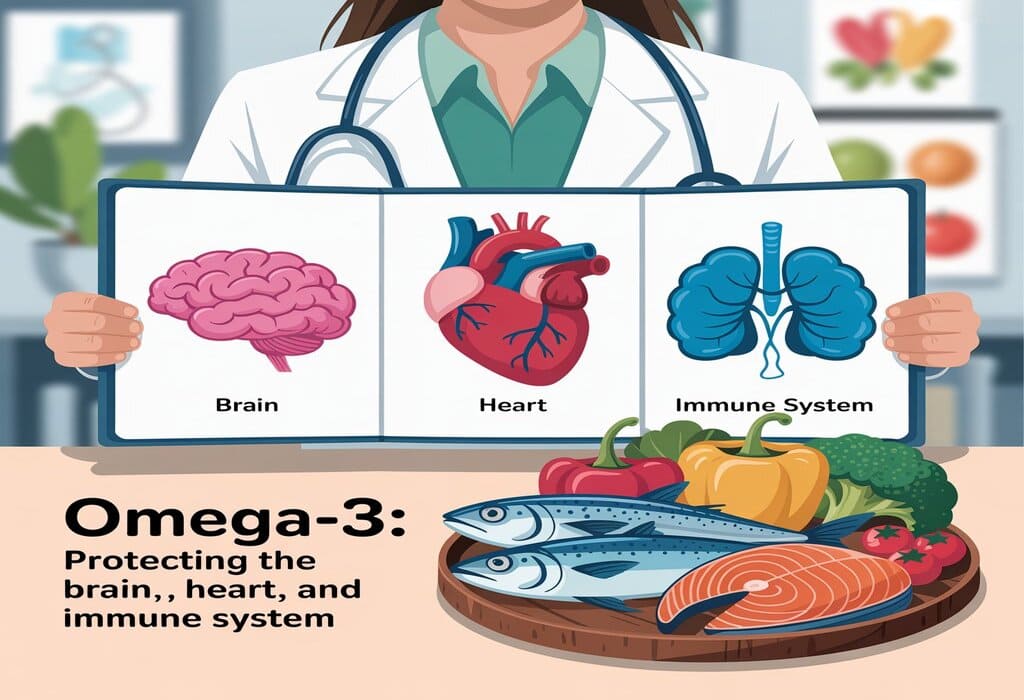
Introduction
Fish is widely recognized as one of the most nutrient-rich foods, making it a vital component of a healthy diet. It is an excellent source of high-quality protein, essential vitamins, and minerals, as well as omega-3 fatty acids, known for their role in protecting the heart, brain, and immune system. Global health authorities, such as the World Health Organization (WHO) and the American Heart Association (AHA), recommend regular fish consumption to benefit from its protective and therapeutic properties. In this article, we explore the top health benefits of fish, supported by the latest scientific studies from leading doctors and nutrition experts.
Key Health Benefits of Eating Fish
1. Boosting Brain and Nervous System Health
Fatty fish like salmon, sardines, and tuna are rich in omega-3 fatty acids (DHA and EPA), which are essential for brain development and function.
✅ Proven Benefits:
- Enhances fetal brain development during pregnancy (Dr. Michael Crawford, Brain Institute – London).
- Reduces the risk of Alzheimer’s disease and dementia by up to 35%, as shown in a 2022 Journal of Neurology study.
- Improves memory and cognitive performance in children, students, and seniors.
📊 Suggested Infographic: Brain performance comparison between regular fish eaters and non-consumers.

2. Supporting Heart and Cardiovascular Health
Numerous studies confirm that eating fish at least twice a week can reduce the risk of heart disease by up to 30%.
✅ Benefits Include:
- Lowering bad cholesterol (LDL) and increasing good cholesterol (HDL).
- Reducing the risk of heart attacks and strokes.
- Enhancing blood vessel flexibility and lowering blood pressure.
📚 A study published in the American Journal of Cardiology found that omega-3 intake can reduce the risk of sudden cardiac death by 45%.

3. Preventing Inflammation and Joint Diseases
Fatty fish contain natural anti-inflammatory compounds, making them a nutritional ally for:
- Rheumatoid arthritis
- Psoriasis and other inflammatory skin conditions
- Inflammatory bowel diseases such as Crohn’s disease and ulcerative colitis
🧬 According to Dr. Nancy DeGroot (Harvard University, 2023), omega-3 significantly reduces inflammatory markers in the blood.
4. Lowering Cancer Risk
Scientific evidence suggests that regular fish consumption may reduce the risk of several types of cancer:
- Colorectal and prostate cancer
- Breast and gastrointestinal cancer
- Oral and esophageal cancer
📚 The British Journal of Cancer reported that fatty fish can reduce colorectal cancer risk by 20%.

5. Preventing Childhood Asthma
Children who consume fish regularly have a 24% lower chance of developing asthma, according to a Dutch study from Maastricht University.
✅ Core Benefit: Omega-3 helps reduce inflammation in the respiratory airways and strengthens the immune system.
6. Supporting Diabetes Management
Fish is an excellent choice for individuals with type 2 diabetes, helping to:
- Improve insulin sensitivity
- Regulate blood sugar levels
- Reduce the risk of complications such as cardiovascular disease and nerve damage
🧠 Nutrition Tip: Combine fish with leafy greens and legumes for a balanced diabetic-friendly meal.
Fish and Weight Loss
- High in protein: Promotes long-lasting satiety.
- Low in calories: Ideal for low-fat, weight-loss diets.
- Recommended cooking methods: Grilling or steaming to retain nutrients and avoid unhealthy fats.
📊 Suggested Chart: Caloric comparison of grilled vs. fried fish.
Recommended Fish Intake
According to the American Heart Association:
- Optimal frequency: Two servings of fatty fish per week
- Serving size: Around 100–150 grams per portion

Precautions During Pregnancy
Despite the numerous health benefits of fish, pregnant women should avoid high-mercury fish to protect fetal development:
❌ Avoid:
- Shark
- Swordfish
- Large quantities of fresh tuna
✅ Choose:
- Salmon
- Sardines
- Shrimp
🧪 Medical Insight: The U.S. Food and Drug Administration (FDA) recommends 2–3 servings per week of low-mercury fish during pregnancy.
Conclusion
Fish is among the most complete and health-promoting foods, offering benefits that span brain development, heart protection, bone health, immune support, and weight management. To maximize these advantages, choose safe types of fish and adopt healthy cooking practices. Incorporating fish into your diet is a powerful step toward a balanced lifestyle and long-term wellness.
Make fish a regular part of your diet and enjoy a healthier life — today and in the future!






